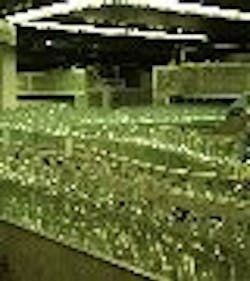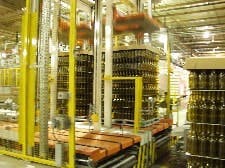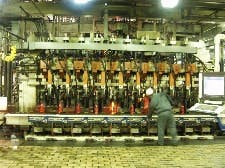One billion bottles a year on the wall
|
W |
hen it comes to making all of the bottles for one of the largest winemaking operations in the world, production processes need to be as clear as the glass itself. At Gallo Glass Co. in Modesto, Calif., just-in-time delivery means the bottles are available when needed, to help keep the wine flowing through the bottling and labeling operations, out to distribution and into millions of homes each year.
The glass plant also has to support the companys commitments to quality, consumer safety and environmental protection. With one billion bottles being produced annually, a production system with monitoring and control software from GE, helps Gallo Glass shine.
A Toast to High Technology
The Gallo Glass plant is one of the worlds largest. It manufactures more than 100 different bottle types in various sizes, shapes and colors, and is the sole supplier to the E. & J. Gallo Winery. It serves a number of external customers, including other wineries, apple juice companies, and makers of specialty beverages such as espresso syrups.
E & J Gallo is unique for having its own glass plant which was built in 1958 on the companys main campus.
By owning a glass plant, the company reduces the freight costs associated with shipping heavy glass and eliminates the possibility of production delays caused by delivery problems from outside bottle suppliers. The primary goal of the glass plant is to maintain a reliable and high quality supply of bottles for the winery.
The glass plant operates 24/7 on 14 production lines. Each line starts with hot, molten glass and ends with inspection, followed by packing. The SFIS presents data collected from all devices on the lines, and at the beginning and end of each line is an iFIX node. With its open architecture, the software is able to connect via Ethernet TCP/IP to the plants installed base of equipment, such as sensing and inspection devices, programmable logic controllers (PLCs), scales and timing systems. The plant uses a client-server database architecture and operates on a server-based computing model. The iClientTS terminal server version of iFIX runs on a CITRIX server farm and has dedicated Windows terminal devices as clients.Automation technologies at the plant started with sensing and inspection devices. From there, Gallo Glass needed to have a way to collect production data to allow the plant to make more informed decisions. The team reviewed many software packages before selecting iFIX as the single HMI / SCADA system for the whole plant. It was critical to implement one interface package and have everyone in the plant operating from the same page and sharing information.Bruce Williams, senior production manager at Gallo Glass, says, SFIS has brought all of my production managers together onto the playing field.Troy Wells, director of maintenance & engineering at Gallo Glass, notes, The Gallo SFIS system has transformed us from a âmake and inspect mentality to a âmake, measure, and improve mentality. This change continually drives us back to the manufacturing process for root cause analysis and correction. SFIS drives us to make it right the first time, and this system never ceases to amaze me with its ability to constantly receive and update information that is vital to the production process.Wells continues, Bottom line is that âWhat gets measured gets improved. SFIS is the catalyst to make this happen. From a maintenance and engineering perspective, SFIS is the first thing I look at each morning; I monitor it throughout the day, and it is the last thing I check at days end.Conceptualized by Gallo, and designed and implemented by integrator Saber Engineering (Auburn, Calif.), the SFIS system includes over 20 HMI screens and generates 30 reports for the glass plant production team. It works with an Oracle database to consolidate the data from the plants devices, and then transform that real-time data into dynamic text, alarm, and graphic displays. Production Snap ShotInformation is presented on the terminals located on the lines for a quick, easy-to-view snapshot of production. Operators and managers can view Key Performance Indicators (KPIs) such as Percent Pack, which displays the number of bottles successfully produced for every 100 attempts; defects, losses, and production quantities by line; and more. The system provides timely notification of defects, so that operators can correct production and boost quality.
Since implementing the system and refining processes, Gallo Glass has increased both the number and quality of bottles that the team makes. Gallo Glass has achieved industry-leading results worthy of a toast!



